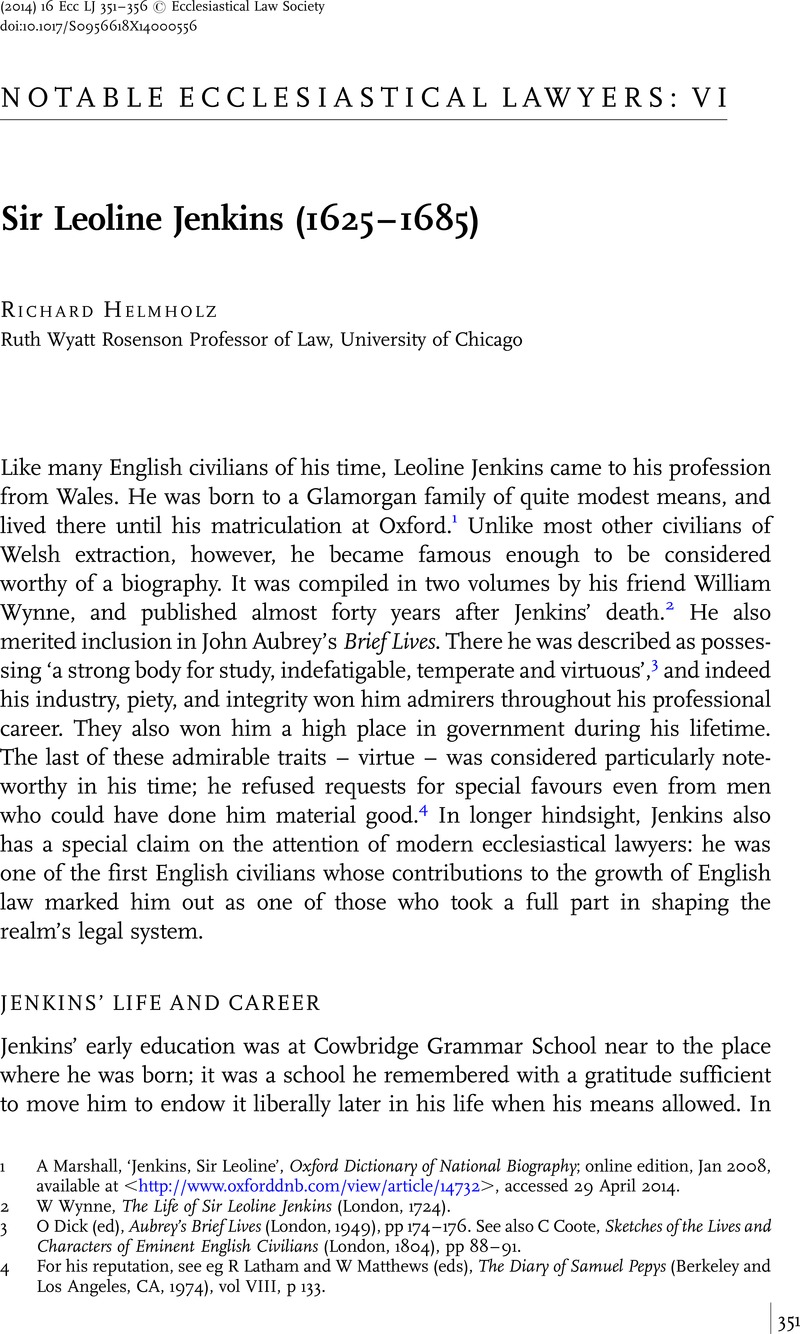No CrossRef data available.
Article contents
Sir Leoline Jenkins (1625–1685)
Published online by Cambridge University Press: 13 August 2014
Abstract

- Type
- Notable Ecclesiastical Lawyers: VI
- Information
- Copyright
- Copyright © Ecclesiastical Law Society 2014
References
1 A Marshall, ‘Jenkins, Sir Leoline’, Oxford Dictionary of National Biography; online edition, Jan 2008, available at <http://www.oxforddnb.com/view/article/14732>, accessed 29 April 2014.
2 Wynne, W, The Life of Sir Leoline Jenkins (London, 1724)Google Scholar.
3 Dick, O (ed), Aubrey's Brief Lives (London, 1949), pp 174–176Google Scholar. See also Coote, C, Sketches of the Lives and Characters of Eminent English Civilians (London, 1804), pp 88–91Google Scholar.
4 For his reputation, see eg Latham, R and Matthews, W (eds), The Diary of Samuel Pepys (Berkeley and Los Angeles, CA, 1974), vol VIII, p 133Google Scholar.
5 Dick, Aubrey's Brief Lives, p 175.
6 Marshall, ‘Jenkins, Sir Leoline’.
7 Wynne, Life, vol I, p vi.
8 See, for example, Burnet, G, History of His Own Time (London, 1724–1734)Google Scholar, vol I, p 481: ‘a man of exemplary life, and considerably learned; but he was dull and slow’.
9 Hardy, E, Jesus College (London, 1899), pp 136–140Google Scholar.
10 Wynne, Life, vol I, p x.
11 Holdsworth, W, History of English Law (London, 1938), vol XII, pp 659–661Google Scholar.
12 Wynne, Life, vol I, p xiii.
13 Roscoe, E, History of the Prize Court (London, 1924), pp 41–42Google Scholar.
14 Wynne, Life, vol I, p 702.
15 Davies, D Llewelyn, ‘The development of prize law under Sir Leoline Jenkins’, (1935) 21 Transactions of the Grotius Society 149–160Google Scholar.
16 Marsden, R, Documents relating to Law and Custom of the Sea, a.d. 1205–1767 (London, 1915–1916), vol II, pp 53–57Google Scholar.
17 See Llewelyn Davies, ‘Development’, pp 158–160.
18 Outhwaite, R, The Rise and Fall of the English Ecclesiastical Courts, 1500–1860 (Cambridge, 2006), pp 33–39Google Scholar.
19 Bonfield, L, Devising, Dying and Dispute: probate litigation in early modern England (Farnham and Burlington, VT, 2012), pp 109–129Google Scholar. For early confirmation, see the prologue to the Statute of Uses, 27 Hen VIII, c 10 (1536), attributing the problem to ‘greedy, covetous persons laying in wait upon them’.
20 See, eg, Ash v Ardy (1678), 3 Swans 664 (App), 36 Eng Rep 1015.
21 29 Car II, c 3 §21. See also Withers, C, Yorkshire Probate (fifth edition, Chippenham, 2006), pp 111–112Google Scholar.
22 Bonfield, Devising, Dying and Dispute, p 73.
23 22 & 23 Car II, c 10.
24 See Wynne, Life, vol II, pp 695–697.
25 Gray, C, The Writ of Prohibition (New York, 2004), vol IV, pp 1–40Google Scholar.
26 Eg Tooker v Loane (1618), Hob 191, 80 Eng Rep 338; Hughes v Hughes (1667), 1 Lev 233, 83 Eng Rep 384. The statutory basis for this intervention was 21 Hen VIII, c 5 (1529–1530).
27 Wynne, Life, vol II, p 697.
28 Usury Act 1571 (13 Eliz I, c 8); Perjury Act 1561 (5 Eliz I, c 9); Easter Offering and Tithes Act 1548 (2 & 3 Edw VI, c 13); Bigamy Act 1603 (1 Jas I, c 11); Drunkenness Act 1606 (4 Jas I, c 5).


